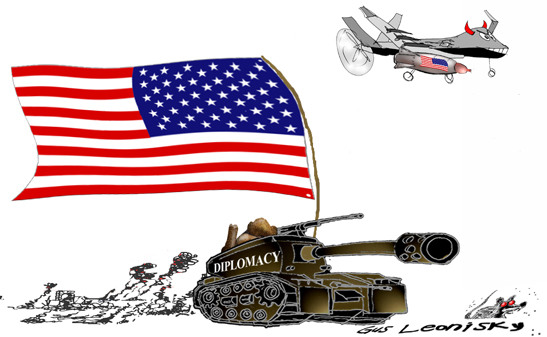Search
Recent comments
- dystopian....
11 min 25 sec ago - losses....
1 hour 1 min ago - board of war....
2 hours 23 min ago - help...
4 hours 5 min ago - APOLOGY....
4 hours 43 min ago - humanoids....
6 hours 44 min ago - refugees....
8 hours 44 min ago - tonight....
8 hours 54 min ago - 10 days?....
9 hours 4 min ago - MI6 parrot.....
9 hours 57 min ago
Democracy Links
Member's Off-site Blogs
diplomacy...

International diplomacy is changing fast.
Career diplomats in Washington are increasingly finding themselves sidelined and distrusted by their own political masters.
Meanwhile, in Beijing, China's foreign policy professionals are being schooled to prioritise nationalistic rhetoric over subtle negotiation.
Then there's the advent of social media and the 24-hour news cycle. The days of discreet deal-making are quickly coming to an end amid the tweets and soundbites of modern political engagement.
It's not all negative, of course, but many leading students of diplomacy worry about the future.
Here are three major trends to be aware of.
A distrust of diplomatic expertise (the United States)When James D Melville resigned from the US diplomatic service in late June, he did so in protest.
The US ambassador to Estonia — a career diplomat — said he could not support the language and actions employed by Donald Trump against his European allies.
Mr Melville's resignation caused a minor media blip, but it was hugely symbolic of the extraordinary change underway in the ranks of the US State Department.
Funding to America's foreign affairs service has decreased by 30 per cent under Mr Trump's brief tenure, to $US37.8 billion.
And according to Tuft University's Monica Duffy Toft, more than 62 per cent of ambassadorial appointments are now political, with career diplomats shunted aside.
"Many career diplomats at the senior levels are stepping down," Professor Duffy Toft says.
"That's worrisome. Mid-level ones are sort of groping their way through it, and then junior people are not going in because they are seeing this denuded State Department.
"They're not sure they're going to have [the] great career that their predecessors had."
Professor Duffy Toft says the prioritising of outsiders over career diplomats reflects the Trump administration's distrust of public service expertise.
But she also says it demonstrates a long-running trend in the United States to value military might ahead of diplomatic prowess.
At $US600 billion, the US Department of Defence budget is more than 12 times that of the State Department. And intelligence and military personnel are increasingly being used as America's chief agents of international affairs.
"Kinetic diplomacy is this idea of diplomacy by armed force, where special operators actually become the face of the United States," Professor Duffy Toft says.
"They are the ones trying to get other countries to do what we want them to do."
She points out that while America has a "special operations" presence in 149 countries, under Mr Trump only 85 of the United States' 188 ambassadorial posts have so far been filled.
"There are some worrisome aspects with the use and the deployment of these special operations forces around the world," she says.
That includes, she says, the lack of public scrutiny afforded by military operations.
Diplomacy as a tool of hyper-nationalism (China)Like the United States, China's diplomatic corps is also undergoing significant change.
Officially, the Government of Xi Jinping talks about harmonious foreign relations, but the Lowy Institute's Merridan Varrall says there are worrying signs for the future.
Read more:
http://www.abc.net.au/news/2018-07-26/the-future-of-diplomacy-trump-chin...
"At no point in the entire history of (hu)mankind, has diplomacy prevented a single war."
Alberto Blatanto
- By Gus Leonisky at 26 Jul 2018 - 8:50am
- Gus Leonisky's blog
- Login or register to post comments
the problem with the next...
http://yourdemocracy.net.au/drupal/node/32147
Of course we all got surprised, like Putin and Lavrov when The Donald got the gig... But in reality, most Embassies and Consulates, are filled with a certain percentage of goons, employed to spy on the host country, a bit like leeches. The art of diplomacy is then to use these spies to disseminate "fake information" in a ballet of double-agents and "pigeons". From time to time a pretext has to be invented to throw most of them out when they get too comfortable with the Champagne and the Canapés, at the White House entertainment centre.
So diplomacy is not what it's supposed to be. We should all know that. It never was what it's supposed to be. History is full of deception and treason through diplomatic channels.
remember him?...
diplomacy at the highest level...